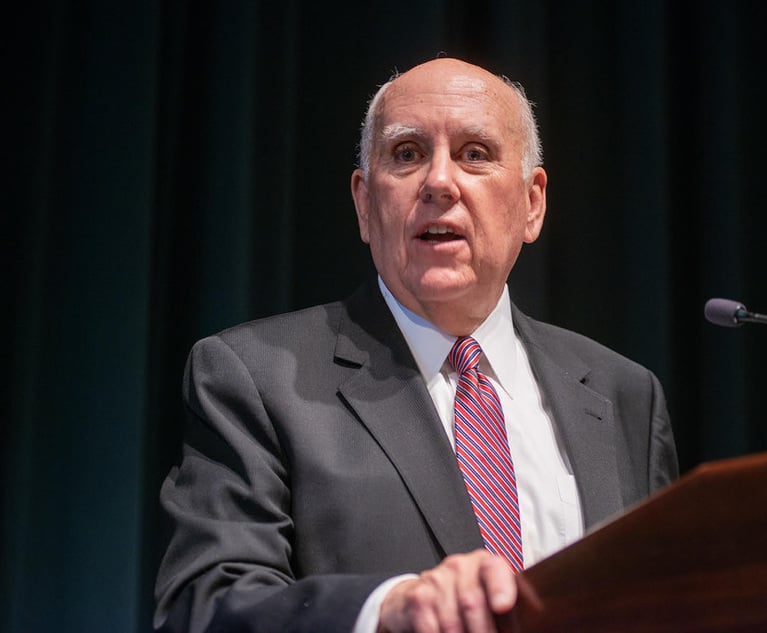 U.S. Supreme Court building. (Diego M. Radzinschi/ALM)
U.S. Supreme Court building. (Diego M. Radzinschi/ALM) Senate Litigation Could Resolve the Supreme Court Confirmation Debate
The Senate's failure to follow a consistent policy for considering Supreme Court nominees is unconstitutional. Instead of succumbing to political bulldozing by their Republican colleagues, Democratic Senators can, and should, resort to the courts to check this arbitrary and unconstitutional maneuvering.
October 09, 2020 at 03:14 PM
4 minute read
The Senate Judiciary Committee has failed to follow a consistent, rational approach to Supreme Court appointments. Before 2016, the well-established custom was that the entire Senate was given the opportunity to provide advice and consent on all Supreme Court nominees, even during the last year of a presidential term. That, of course, all changed in March 2016 with Barack Obama's nomination of Judge Merrick Garland when Republican members of the Judiciary Committee announced a new policy that Supreme Court nominees would not receive consideration during the final year of the President's term. They claimed it was necessary to "give the people a voice," and that this could only be accomplished by withholding holding a seat on the Court vacant until a new President came to power. Four years later, that policy has been reversed in another abuse of power and political shell game by the Republican leadership in the Senate. The same Republican leadership that refused to allow a vote on Judge Garland, because his nomination occurred eight months before the 2016 election, has now forced a vote on Judge Amy Coney Barrett, five weeks before this election with voting already underway. There is no legitimate rationale at work here — it is pure hypocrisy in service of raw political power.
This content has been archived. It is available through our partners, LexisNexis® and Bloomberg Law.
To view this content, please continue to their sites.
Not a Lexis Subscriber?
Subscribe Now
Not a Bloomberg Law Subscriber?
Subscribe Now
NOT FOR REPRINT
© 2024 ALM Global, LLC, All Rights Reserved. Request academic re-use from www.copyright.com. All other uses, submit a request to [email protected]. For more information visit Asset & Logo Licensing.
You Might Like
View All
For Safer Traffic Stops, Replace Paper Documents With ‘Contactless’ Tech
4 minute read
Benjamin West and John Singleton Copley: American Painters in London
8 minute readTrending Stories
Who Got The Work
Michael G. Bongiorno, Andrew Scott Dulberg and Elizabeth E. Driscoll from Wilmer Cutler Pickering Hale and Dorr have stepped in to represent Symbotic Inc., an A.I.-enabled technology platform that focuses on increasing supply chain efficiency, and other defendants in a pending shareholder derivative lawsuit. The case, filed Oct. 2 in Massachusetts District Court by the Brown Law Firm on behalf of Stephen Austen, accuses certain officers and directors of misleading investors in regard to Symbotic's potential for margin growth by failing to disclose that the company was not equipped to timely deploy its systems or manage expenses through project delays. The case, assigned to U.S. District Judge Nathaniel M. Gorton, is 1:24-cv-12522, Austen v. Cohen et al.
Who Got The Work
Edmund Polubinski and Marie Killmond of Davis Polk & Wardwell have entered appearances for data platform software development company MongoDB and other defendants in a pending shareholder derivative lawsuit. The action, filed Oct. 7 in New York Southern District Court by the Brown Law Firm, accuses the company's directors and/or officers of falsely expressing confidence in the company’s restructuring of its sales incentive plan and downplaying the severity of decreases in its upfront commitments. The case is 1:24-cv-07594, Roy v. Ittycheria et al.
Who Got The Work
Amy O. Bruchs and Kurt F. Ellison of Michael Best & Friedrich have entered appearances for Epic Systems Corp. in a pending employment discrimination lawsuit. The suit was filed Sept. 7 in Wisconsin Western District Court by Levine Eisberner LLC and Siri & Glimstad on behalf of a project manager who claims that he was wrongfully terminated after applying for a religious exemption to the defendant's COVID-19 vaccine mandate. The case, assigned to U.S. Magistrate Judge Anita Marie Boor, is 3:24-cv-00630, Secker, Nathan v. Epic Systems Corporation.
Who Got The Work
David X. Sullivan, Thomas J. Finn and Gregory A. Hall from McCarter & English have entered appearances for Sunrun Installation Services in a pending civil rights lawsuit. The complaint was filed Sept. 4 in Connecticut District Court by attorney Robert M. Berke on behalf of former employee George Edward Steins, who was arrested and charged with employing an unregistered home improvement salesperson. The complaint alleges that had Sunrun informed the Connecticut Department of Consumer Protection that the plaintiff's employment had ended in 2017 and that he no longer held Sunrun's home improvement contractor license, he would not have been hit with charges, which were dismissed in May 2024. The case, assigned to U.S. District Judge Jeffrey A. Meyer, is 3:24-cv-01423, Steins v. Sunrun, Inc. et al.
Who Got The Work
Greenberg Traurig shareholder Joshua L. Raskin has entered an appearance for boohoo.com UK Ltd. in a pending patent infringement lawsuit. The suit, filed Sept. 3 in Texas Eastern District Court by Rozier Hardt McDonough on behalf of Alto Dynamics, asserts five patents related to an online shopping platform. The case, assigned to U.S. District Judge Rodney Gilstrap, is 2:24-cv-00719, Alto Dynamics, LLC v. boohoo.com UK Limited.
Featured Firms
Law Offices of Gary Martin Hays & Associates, P.C.
(470) 294-1674
Law Offices of Mark E. Salomone
(857) 444-6468
Smith & Hassler
(713) 739-1250








